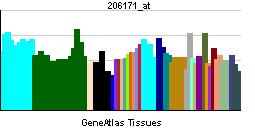Adenosine A3 receptor
| Adenosine A3 receptor | |||||||||||
|---|---|---|---|---|---|---|---|---|---|---|---|
| Identifiers | |||||||||||
| Symbols | ADORA3 ; A3AR; AD026; RP11-552M11.7; bA552M11.5 | ||||||||||
| External IDs | Template:OMIM5 Template:MGI HomoloGene: 550 | ||||||||||
| |||||||||||
| RNA expression pattern | |||||||||||
 | |||||||||||
| More reference expression data | |||||||||||
| Orthologs | |||||||||||
| Template:GNF Ortholog box | |||||||||||
| Species | Human | Mouse | |||||||||
| Entrez | n/a | n/a | |||||||||
| Ensembl | n/a | n/a | |||||||||
| UniProt | n/a | n/a | |||||||||
| RefSeq (mRNA) | n/a | n/a | |||||||||
| RefSeq (protein) | n/a | n/a | |||||||||
| Location (UCSC) | n/a | n/a | |||||||||
| PubMed search | n/a | n/a | |||||||||
The adenosine A3 receptor, also known as ADORA3, is an adenosine receptor, but also denotes the human gene encoding it.
Function
Adenosine A3 receptors are G-protein-coupled receptors that are involved in a variety of intracellular signaling pathways and physiological functions. It mediates a sustained cardioprotective function during cardiac ischemia, it is involved in the inhibition of neutrophil degranulation in neutrophil-mediated tissue injury, it has been implicated in both neuroprotective and neurodegenerative effects, and it may also mediate both cell proliferation and cell death.
Gene
Multiple transcript variants encoding different isoforms have been found for this gene.[1]
Therapeutic implications
An adenosine A3 receptor agonist (CF-101) is in clinical trials for the treatment of rheumatoid arthritis.[2] In a mouse model of infarction the A3 selective agonist CP-532,903 protected against myocardial ischemia and reperfusion injury. [3]
References
- ↑ "Entrez Gene: ADORA3 adenosine A3 receptor".
- ↑ Silverman MH, Strand V, Markovits D; et al. (2007). "Clinical Evidence for Utilization of the A3 Adenosine Receptor as a Target to Treat Rheumatoid Arthritis: Data from a Phase II Clinical Trial". J Rheumatol. PMID 18050382.
- ↑ Wan TC, Ge ZD, Tampo A; et al. (2007). "The A3 adenosine receptor agonist CP-532,903 protects against myocardial ischemia/reperfusion injury via the sarcolemmal ATP sensitive potassium channel". J Pharmacol Exp Ther. doi:10.1124/jpet.107.127480. PMID 17906066.
Further reading
- Klotz KN (2001). "Adenosine receptors and their ligands". Naunyn Schmiedebergs Arch. Pharmacol. 362 (4–5): 382–91. PMID 11111832.
- Monitto CL, Levitt RC, DiSilvestre D, Holroyd KJ (1995). "Localization of the A3 adenosine receptor gene (ADORA3) to human chromosome 1p". Genomics. 26 (3): 637–8. PMID 7607699.
- Salvatore CA, Jacobson MA, Taylor HE; et al. (1993). "Molecular cloning and characterization of the human A3 adenosine receptor". Proc. Natl. Acad. Sci. U.S.A. 90 (21): 10365–9. PMID 8234299.
- Sajjadi FG, Firestein GS (1993). "cDNA cloning and sequence analysis of the human A3 adenosine receptor". Biochim. Biophys. Acta. 1179 (1): 105–7. PMID 8399349.
- Murrison EM, Goodson SJ, Edbrooke MR, Harris CA (1996). "Cloning and characterisation of the human adenosine A3 receptor gene". FEBS Lett. 384 (3): 243–6. PMID 8617363.
- Bonaldo MF, Lennon G, Soares MB (1997). "Normalization and subtraction: two approaches to facilitate gene discovery". Genome Res. 6 (9): 791–806. PMID 8889548.
- Bouma MG, Jeunhomme TM, Boyle DL; et al. (1997). "Adenosine inhibits neutrophil degranulation in activated human whole blood: involvement of adenosine A2 and A3 receptors". J. Immunol. 158 (11): 5400–8. PMID 9164961.
- Atkinson MR, Townsend-Nicholson A, Nicholl JK; et al. (1998). "Cloning, characterisation and chromosomal assignment of the human adenosine A3 receptor (ADORA3) gene". Neurosci. Res. 29 (1): 73–9. PMID 9293494.
- Palmer TM, Harris CA, Coote J, Stiles GL (1997). "Induction of multiple effects on adenylyl cyclase regulation by chronic activation of the human A3 adenosine receptor". Mol. Pharmacol. 52 (4): 632–40. PMID 9380026.
- Liang BT, Jacobson KA (1998). "A physiological role of the adenosine A3 receptor: sustained cardioprotection". Proc. Natl. Acad. Sci. U.S.A. 95 (12): 6995–9. PMID 9618527.
- Dougherty C, Barucha J, Schofield PR; et al. (1999). "Cardiac myocytes rendered ischemia resistant by expressing the human adenosine A1 or A3 receptor". FASEB J. 12 (15): 1785–92. PMID 9837869.
- Murphy WJ, Eizirik E, Johnson WE; et al. (2001). "Molecular phylogenetics and the origins of placental mammals". Nature. 409 (6820): 614–8. doi:10.1038/35054550. PMID 11214319.
- Gao ZG, Chen A, Barak D; et al. (2002). "Identification by site-directed mutagenesis of residues involved in ligand recognition and activation of the human A3 adenosine receptor". J. Biol. Chem. 277 (21): 19056–63. doi:10.1074/jbc.M110960200. PMID 11891221.
- Broussas M, Cornillet-Lefèbvre P, Potron G, Nguyên P (2003). "Adenosine inhibits tissue factor expression by LPS-stimulated human monocytes: involvement of the A3 adenosine receptor". Thromb. Haemost. 88 (1): 123–30. PMID 12152652.
- Merighi S, Mirandola P, Milani D; et al. (2002). "Adenosine receptors as mediators of both cell proliferation and cell death of cultured human melanoma cells". J. Invest. Dermatol. 119 (4): 923–33. doi:10.1046/j.1523-1747.2002.00111.x. PMID 12406340.
- Trincavelli ML, Tuscano D, Marroni M; et al. (2002). "A3 adenosine receptors in human astrocytoma cells: agonist-mediated desensitization, internalization, and down-regulation". Mol. Pharmacol. 62 (6): 1373–84. PMID 12435805.
- Strausberg RL, Feingold EA, Grouse LH; et al. (2003). "Generation and initial analysis of more than 15,000 full-length human and mouse cDNA sequences". Proc. Natl. Acad. Sci. U.S.A. 99 (26): 16899–903. doi:10.1073/pnas.242603899. PMID 12477932.
- Feoktistov I, Ryzhov S, Goldstein AE, Biaggioni I (2003). "Mast cell-mediated stimulation of angiogenesis: cooperative interaction between A2B and A3 adenosine receptors". Circ. Res. 92 (5): 485–92. doi:10.1161/01.RES.0000061572.10929.2D. PMID 12600879.
- Gao ZG, Kim SK, Gross AS; et al. (2003). "Identification of essential residues involved in the allosteric modulation of the human A(3) adenosine receptor". Mol. Pharmacol. 63 (5): 1021–31. PMID 12695530.